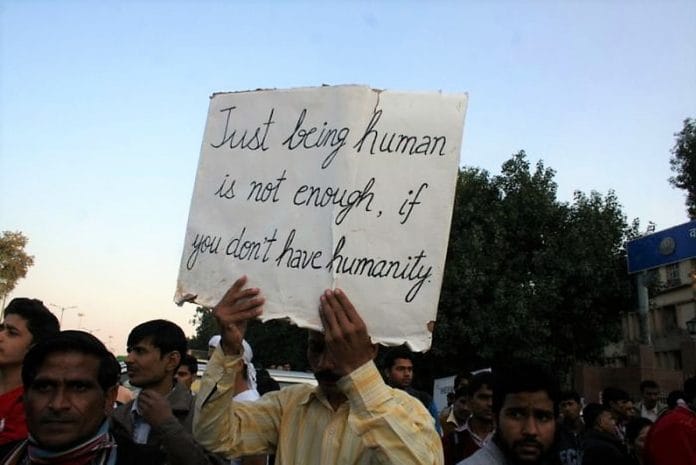The past few years have been a barrage of incident after incident, defeat over defeat.
December 2012 was a pivotal month for a lot of Indians of my age. The violent rape of Jyoti Singh Pandey commonly referred to as the ‘Nirbhaya’ rape case, caused the country to boil over. The protests weren’t just for show. The anger, the hurt, the anguish of people translated itself to the Justice Verma committee that took public suggestions into account, sifted through over 80,000 inputs, and eventually lead to the Criminal Law (Amendment) Act, 2013.
Did the amendment work? Not demonstrably, no. The Justice Verma committee report, filled with fantastic ideas on how to make cohesive policy changes to help improve the terrible condition of women’s safety in India was never implemented in its whole spirit.
I wonder where that spirit died down the line.
The date 8 April 2018 seems like a rather innocuous date, but we’re going to look back at it and realise that it was the day when whatever remained of India’s ability to be human died an undignified, sordid death. Two incidents, one in Kathua, Jammu and Kashmir, and the other in Unnao, Uttar Pradesh struck at the core of all that India supposedly stands for.
The bar association of Kathua tried to obstruct the police from filing the chargesheet in the horrific rape and murder case of an 8-year-old child from the nomadic Muslim tribe of Bakherwal. The investigation of this crime was already marred by political interference, with BJP ministers and MLAs, Chowdhary Lal Singh, Chander Prakash Ganga, Rajeev Jasrotia and Kuldip Raj attending a rally in support of the accused. The lawyers stalled the chargesheet filing for 6 hours, making a mockery of the judiciary, due process, and the idea of justice itself.
Just a few states south of Jammu & Kashmir, Unnao saw another Shakespearean tragedy unfold. A Dalit woman and her family who had accused BJP MLA Kuldeep Singh Sengar and his accomplice of raping her tried attempting suicide outside Chief Minister Yogi Adityanath’s residence. As the police prevented them from doing so, they took her father into custody. He’s dead now. Justice, with the S.K. Mahajan judgment, might be a dim dream for this family. In the middle of the furor this death caused, a smiling Sengar on his way to meet the CM said, ‘Arrey wo nimn star ke log hain, apradhiyon ki saazish hai.‘ – ‘These are people of a lower standing, and this is a conspiracy against me.’
Both these incidents should have upended the country. India has always had a shameful history of waging its ideological wars on the bodies of women, but these cases were especially rankling. A child from a vulnerable minority and a young Dalit woman were both let down by the system designed to protect them. If only the mainstream media paused its breathless coverage of the Indian National Congress members eating chhole bhature before their ‘symbolic fast’ against atrocities faced by minorities today (with prime accused of the 1984 pogrom against Sikhs, Jagdish Tytler, gracing the stage). The ruling party’s representatives found time to lambast the opposition for ‘lack of sensitivity’, while somehow managing to keep completely mum on these rape cases.
As this mockery of what India promised its minorities unfolded, I wondered if this is apathy or simple exhaustion. The past few years have been a barrage of incident after incident, defeat over defeat. As the powerful have consolidated their positions, the vulnerable populations of India have never been as disenfranchised as they are now. Public discourse has mutated into one that distorts facts, realities, and harsh truths, rendering them ineffectual against a wave of toxic jingoism and hatred. I wonder if people are simply tired of the kind of anger and helplessness they feel and are now choosing the easier way of lulling themselves into complacency with the promises they know deep down are never going to be fulfilled.
This is a failure of not just the media and the state machineries because those have been on their juggernaut towards failure for years now. This is the diminishing of the ‘indomitable’ spirit of empathy and humankind that we simply assumed would continue to flourish, irrespective of us feeding it or not. Turns out, hope dies too, and it does so quietly. The people who once took to the streets to take back agency over their basic rights have been reduced to sceptics with very little faith left in them.
Poet Dylan Thomas once wrote, ‘Do not go gentle into that good night/ Rage, rage against the dying of the light.’ The night we’re entering is not a good night. It’s a dark, dreary place of abuse and suffering. Sadly, we’ve become passive travellers on this journey, and I don’t know if we’re capable of turning back.
Harnidh Kaur is a poet and feminist.







Women legislators and ministers, from states and the centre, cutting across party lines, should make their voices heard. Some of them could also visit the bereaved, traumatised families, offer sympathy and support. One would not entirely share the columnist’s sense of despair and despondence. This is how the grime of anti incumbency accumulates.